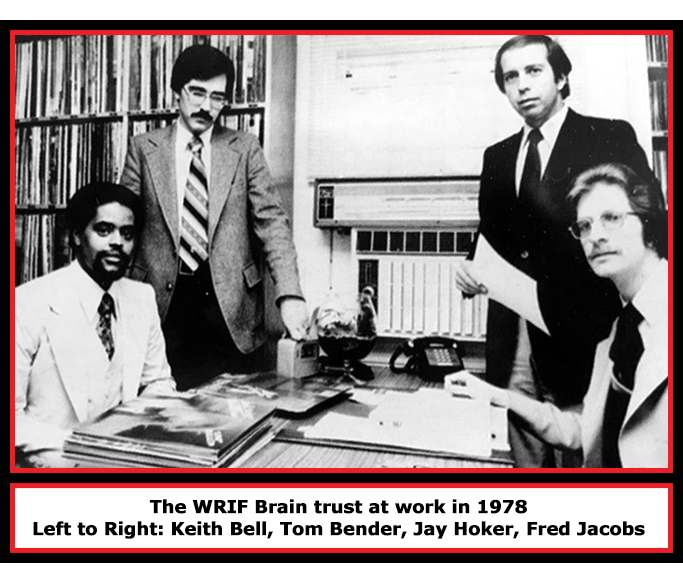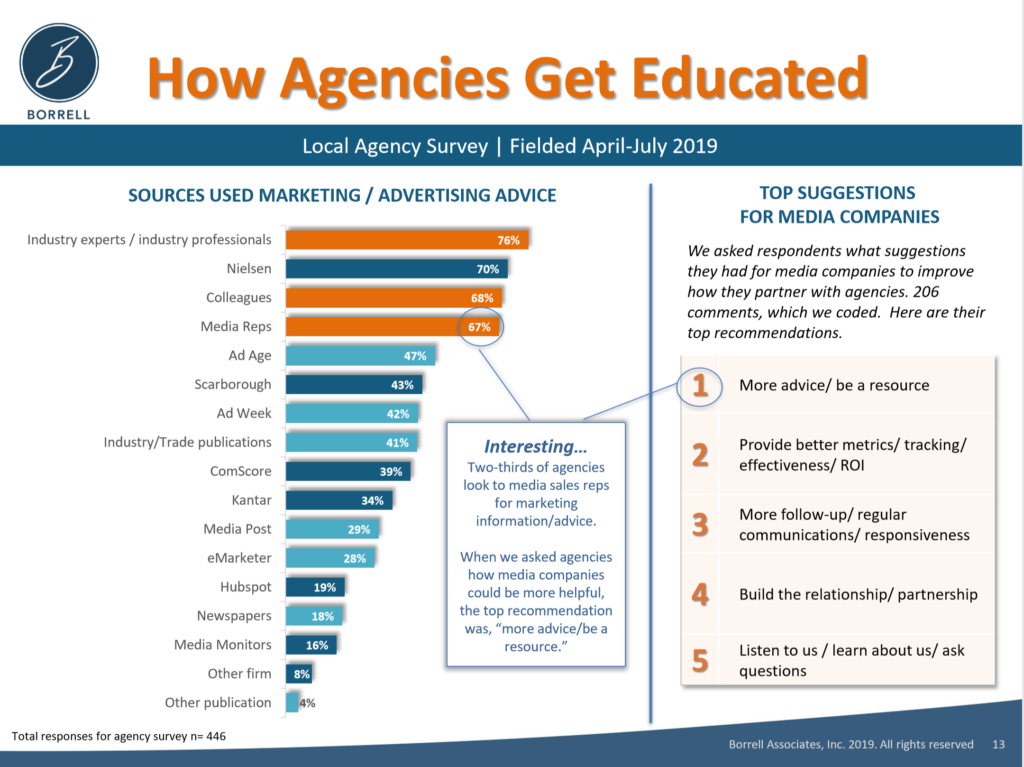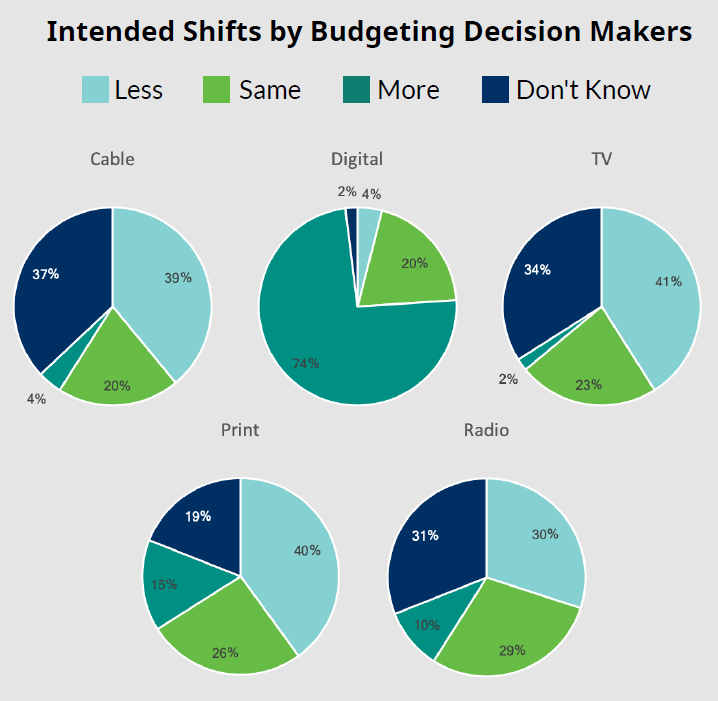
Even us bloggers need a break now and then. For today’s post, I’ve handed the keyboard over to Paul Jacobs, our resident sales guru who spends an inordinate amount of time working with sales staffs, presenting to advertisers, and telling radio’s story. Armed with new research, Paul makes an important point about the radio’s opportunity to once again become thought leaders in the research/ratings space.
And of course, Paul took the challenge to heart, and even found yet another embarrassing photo of me from the old days, when turntables, cart machines, and splicing blocks were the norm inside every radio station. Ah, yes – the (sort of) good old days. – FJ
When most people think back Fred’s days at WRIF, few remember that he actually started as the station’s Research Director, not the PD. He had been head of Frank Magid‘s radio and publishing division before joining WRIF. Back in those days, research was a priority and many stations – especially in major markets – had a Research Director. This was Fred’s entrée into his hometown favorite radio station – and he jumped at the chance.
Our General Manager, Jay Hoker, not only was budget-conscious (some things don’t change), but he was also pragmatic. He knew Fred hadn’t worked at a station before so he wanted him to gain some practical experience. So with some budget trickery, Jay assigned Fred a few accounts to give him a taste of radio sales.
While this was way out of Fred’s comfort zone (and he wasn’t a happy camper), it provided him with valuable insight into how advertisers think, as well as empathy for the plight of salespeople. He’s always been a great dot connector, and ended up learning a lot from this experience about client needs, how they used ratings and research, and most importantly, how he could take his strengths to advertisers and help solve their problems.
(Side note: isn’t it interesting back then, all there was to analyze was radio ratings, yet we had a Research Director. Today, stations have multiple metrics to analyze – streaming, mobile downloads, the email database, and more. Yet, there’s frequently no one on staff with the expertise to sift through the data, package it, and turn it into effective sales stories for advertisers – and to the station’s salespeople who need all the support they can get).
During this period, Arbitron was the big dog ratings service, but client satisfaction was not especially good (some thing don’t change). And in 1978, two serious competitors – Burke and Trac 7 – stepped up to challenge the monolith in Beltsville, Maryland. These two challengers were pitching their services to radio stations, looking to uproot Arbitron. But wisely, they were also working the agencies in the hope that a few defections could destabilize Arbitron’s monopoly in the marketplace. Burke and Trac 7 used very different methodologies, and Fred discovered there was a lot of confusion brewing among advertisers.
Fred seized the opportunity, and hosted a forum for the entire Detroit advertising community where reps from the three ratings services could tell  their stories. Fred moderated the session, asked the tough questions, and the result was educating the market about a changing ratings landscape. The event not only helped advertisers compare these services side-by-side, but more importantly, it established and cemented WRIF – this FM AOR station located in three house trailers – as a credible, go-to resource for ratings and research.
their stories. Fred moderated the session, asked the tough questions, and the result was educating the market about a changing ratings landscape. The event not only helped advertisers compare these services side-by-side, but more importantly, it established and cemented WRIF – this FM AOR station located in three house trailers – as a credible, go-to resource for ratings and research.
And that was the point. Even though the bigger agencies all had their own versions of Fred – research mavens who spent lots of time studying the nooks and crannies of the ratings – an in-house source at a radio station could be a difference maker. CKLW – still a powerhouse back then – hired Radio & Records’ research columnist for this same position. And it was game-on. Even the two local newspapers – the Free Press and the Detroit News covered these ratings stories.
Fast-forward to today, and it feels like despite so many changes in the ways radio can deliver audience to advertisers, the same challenge remains – advertisers are confused and overwhelmed by information and are looking for help to figure it out.
Jacobs Media has conducted research among advertisers in a number of markets over the past half dozen years are so to better understand their shifting priorities, as well as their perceptions about a changing media marketing ecosystem.
We typically hear two key thoughts from most of them:
- They want digital. They’ve seen, read, and heard enough about it to know it needs to be a key part of their media marketing mix. And they’re watched their kids using their gadgetry to play games, listen to music, and commune with one another.
- They don’t know what the hell it is. Talk to most advertisers who let their hair down, and most will tell you they’re confused by the space, the choices, the data, and what it all means.
Here’s where radio has an opportunity to once again take a leadership role.
Last week, Borrell Associates released their 2019 Local Ad Agency Survey. As is always the case, it’s chock full of important information about the current mindset and revenue trajectory of radio, digital, and other media players. But deeper in the study was a slide that brought back memories of this age-old problem called, “How Agencies Get Educated.”

It’s fascinating that a key finding is that agencies believe media reps still play a key role as an important resource for information and advice (and it ranks pretty close to the top). Many agencies have experienced their own cutbacks, and what was the “research department” may be no more. And then there’s local advertisers who have to manage their way through myriad digital advertising opportunities, often getting lost in the hype and the numbers.
This should be fuel for radio broadcasters to satisfy this need, stand apart from the pack, and most importantly control the narrative. But being a resource requires a lot more than bringing by information on your station or cluster – it means bringing an objective, third-party perspective, and it requires having knowledge, insights, and solutions across all platforms.
This April, Adtaxi published a study of 100+ marketing professionals, seeking to learn where they plan to allocate ad dollars in the coming year. The findings are daunting: Three-fourths (74%) say they are planning to spend more in digital. And given that marketing is usually a zero-sum game, who’s losing out?
Traditional media advertising, especially television broadcasters, is experiencing the biggest cutbacks as cord-cutting and OTT has really taken hold. Radio is also losing dollars, but appears to be in a better position among heritage media outlets.
 Over the past few years, we’ve been tasked by a number of radio broadcasting companies to help them forge their digital transformations. While rethinking content creation and its distribution strategies is profoundly challenging, I’ve found it’s a much heavier lift on the sales side.
Over the past few years, we’ve been tasked by a number of radio broadcasting companies to help them forge their digital transformations. While rethinking content creation and its distribution strategies is profoundly challenging, I’ve found it’s a much heavier lift on the sales side.
Here’s how Adtaxi analyzes the current environment for traditional and digital media:
“Traditional advertising channels are becoming more expensive and reach an ever-declining audience. But digital advertising channels are still growing, with expanded opportunities to come over the next several decades. It can be difficult to navigate these channels, especially as best practices and technologies change at a rapid pace, but brand success and the ability to prove ROI depend on your business’ ability to jump in and reach buyers where they are, especially in a fluctuating economy.”
All the more reason why radio broadcasters need to focus their efforts on integrated sales strategies, providing advertisers with both branding and accountability. Teaching AE’s about emerging technologies and new metrics is tough enough.
Then there’s the idea of reaching key decision-makers, and having knowledge of and confidence in the station’s digital products. Borrell and Adtaxi make the case that if radio doesn’t address the challenge and the opportunity, advertisers will make their decisions and move on.
Agencies and small business owners are more overwhelmed, confused, and worried than at any time in the past. Today, they not only don’t know which digital platforms are best for their needs, they don’t know who to trust. AI and algorithms cannot hold their hands.
Enter radio.
Radio broadcasters have the ability to be that trusted, go-to resource for advertisers. Radio has boots on the ground, as well as connections in the local community. And most importantly, advertisers have a need and thirst for credible information. Smart, aggressive stations – and the companies that own them – can fill it by becoming that credible resource.
To that end, here are some suggestions:
- Hire a Research Director (Yes, I realize it’s 2019 and there’s no budget for the position). But all that consolidation means that many radio companies have the resources to at least hire research intelligence on the corporate level. Smaller market broadcasters might consider partnering with a third-party firm or a local college professor with knowledge of the space to provide real information and analysis for the advertising community.
- Develop a content marketing strategy. We’ve learned most radio stations do not have an adequate database of local and regional advertisers. Make it a priority to develop a current, well-groomed email database – not just of radio advertisers and agencies – but of the general business community. You’d be amazed how many businesses are spending in digital. Create useful content, and get it in the hands of the advertising community to help establish your station as a credible research resource in your market.
- Conduct your own research. Over the past several years, we’ve conducted one-on-one interviews with advertisers and conducted quantitative surveys. It’s not only the best way to assess their needs, but research is marketing – the very fact you’re surveying your clients about this area establishes your credibility. And when the results are in, conduct a marketwide webinar and share the results.
- Host forums. Maybe call them Meet-Ups. As Fred did back in the day at WRIF, bring in research and metrics experts and host forums for the advertising community. Your very presence as the host station (or cluster or company) can give you the pole position in the minds and hearts of local advertisers.
- Train your salespeople. This is the biggest challenge, but if your frontline team isn’t a strong resource, your brand is weakened. As we’ve learned (often the hard way), not every sales rep is capable of excelling in this area. (More on that in another post.) Just as it was folly to ask everyone on the airstaff to write a blog, it is impractical to expect every seller will grasp these concepts, and turn their skills into newfound sales. So, focus on those who “get it,” who have the desire to transform, and can be thought leaders in your cubicles.
Establishing yourself as a leader in marketing strategy, tactics, ratings, and digital isn’t as difficult as you might think. WRIF did it in the 70’s with one guy. Get your company behind you, and you can make this happen.
Most other media sources in the market – newspapers, TV, direct mailers, and the digital players – aren’t investing in this area. And as they say, in the land of the blind, the one-eyed dragon is king.
Maybe in 2020, that’s radio.
You can access the Borrell Associates study here.
You can access the Adtaxi whitepaper here.
- For Radio, Will It Be Christmas In April (And Hopefully, May)? - April 21, 2025
- The Revolution Will Not Be Monetized - December 30, 2024
- What Kind Of Team Do You Want To Be? - October 4, 2024




Paul, Great article. Research = Interpretation + Combined Application. Even simple 12+ numbers tell a story with applicable trends. No substitute for knowing a market and understanding what makes radio tick! Thank you.
Thanks, Clark. Despite the fact most radio stations/companies don’t have the budgets they used to, they can still execute on a smart strategy. Advertisers need help, and hopefully stations can fill that need and capture these digital dollars – PJ
Do you ever get bored with being spot on so often?? Great piece and much appreciated.
Ha ha. Thanks for the kind words (and Paul actually wrote it!).
Well, I don’t write many of them like Fred does Tom, so my job is easier.
But I appreciate what you said anyway! Thanks